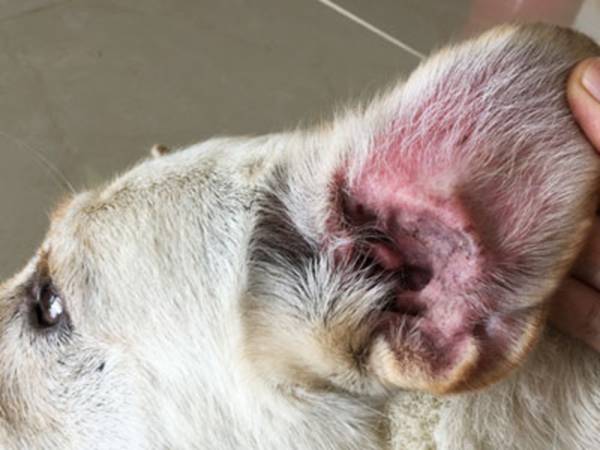Connect with a verified veterinarian in minutes. Licensed vets are available 24/7 to answer your questions. No need to worry about your furry family member.
Did you know that ear infections are a common problem in dogs? It’s thought that as many as 20% of dogs suffer from ear infections.
If your dog has warm ears, it could be caused by an ear infection. In this article, we’ll take a look at ear infections, their common causes, and treatment.
Dog’s Body Temperature
A dog’s temperature is one of the first signs that a dog is ill. If the temperature is elevated and there are no other symptoms, it’s possible that a dog has an ear infection. Ear infections are common in dogs, especially in those that have thin hair around their ears. This can be caused by bacteria or yeast infections, or by allergies to plants and trees. Dogs with allergies may also develop ear infections due to the allergens in the environment.
Ear infections occur when an infection gets into the middle ear (which holds your dog’s eardrum). The middle ear contains many small tubes that carry air to and from your dog’s inner ear. These tubes are very sensitive to germs and other particles, so any bacteria or viruses can get into these tubes easily. The infection will then travel through these tubes to your dog’s inner ear where it will damage cells and cause pain and discomfort.
The normal body temperature of a dog is between 101° to 102.5° Fahrenheit. However, dogs that have ear infections will often have a fever as high as 104 degrees Fahrenheit. This can make your pooch very uncomfortable and lead to other symptoms like lethargy, vomiting, diarrhea, and lack of appetite.
A dog’s fever can be one of the first signs that it has an ear infection. If you see a high fever, check your dog’s ears for redness and drainage.
Health Problems Related to Body Temperature
There are certain health conditions that can be exacerbated by elevated body temperature. These include heat stroke, sunstroke, heart disease, infection, and respiratory problems.
Healthy dogs do not normally have temperatures above 101° to 102.5° Fahrenheit. Heat stroke is a serious health condition that occurs when a dog’s body temperature gets to 104 degrees Fahrenheit or higher. This is a very dangerous condition and can be fatal if not treated quickly. Symptoms of heat stroke include lethargy, excessive panting, disorientation, and confusion. The dog may also become weak and unable to stand up or walk.
Flea infestation can cause an increase in a dog’s body temperature. Fleas can become infected with parasites and bacteria and will release chemicals that cause the dog’s body temperature to rise. If a dog has fleas, it is important to have the infestation treated by a vet as soon as possible.
Ear infections can also lead to a rise in body temperature. Your dog’s ears can become irritated and inflamed, which can cause an increase in your dog’s body temperature. Ear infections are more common in dogs that have short hair around their floppy ears.

Review symptoms, medications & behavior to keep your pets healthy with a Vet Online in just minutes.
Ask a Vet Live NowWhat Causes Ear Infections in Dogs?
First, there are three different types of ear infections in dogs including:
- Otitis externa: this is an infection of the outer part of the dog’s ears.
- Otitis media: this is a middle ear infection
- Otitis interna: is an infection of the inner ear
Of these ear infections, the most serious are otitis media and otitis interna. These can develop from an infection of the outer ear. If left untreated, they can cause deafness, facial paralysis, vestibular signs (head shaking and itching, for instance).
One more note—it’s possible for a dog to develop an infection of both the middle and inner ears at the same time.
Ear infections can be caused by:
- Ear mites
- Allergies
- Bacterial & fungal infections
- Parasites
- Autoimmune issues
- Endocrine disorder (such as thyroid disease)
- Wax buildup
- Foreign bodies
- Injury of the ear canal
- And more
The immune system plays a role in the healing process of ear infections. Dogs with severe ear infections will often have signs of an immune system deficiency.
Loss of appetite is also a common symptom of ear infections. When your dog is not eating, it is difficult for them to gain the nutrition they need to fight off an infection. This can lead to the dog’s body using up energy that it needs for other functions.
In addition, allergic reaction to the dog’s environment may also lead to ear infections. The symptoms of an allergic reaction can include:
- Dry nose or runny nose
- Redness of the eyes and skin
- Itchy skin
- Wheezing or coughing
If your dog has a loss of appetite and is vomiting, have them checked by a veterinarian. The vet will be able to rule out any other causes for the vomiting, such as parasites or endocrine issues. You should also keep your healthy dog away from dogs that are known to have ear infections until the symptoms go away.
Symptoms of an Ear Infection in Dogs
You may notice these symptoms if your dog has an ear infection:
- Excessive scratching of the ear
- Head shaking
- Odor
- Hot ear(s)
- Redness
- Swelling in the ear canal
- Pain
- Dark discharge
- Itchiness
- Crusting and scabs in the ears
A dog’s nose is also very sensitive to germs and will get infected easily. Dogs with ear infections will often have a wet, crusty discharge coming from their ears. A dog’s skin around the ear will also often be red and irritated. Vaccinations, regular grooming, and proper ear cleaning can help prevent infections from occurring.
Your dog’s gums may also be very sore, especially if they have had a very large amount of wax build up in their ears. This wax can also become impacted in the ear canal and may need to be removed by your vet.
If you notice any of these symptoms in your dog, then it’s time to call the vet. Left untreated, ear infections can become worse and lead to other dog health issues.
Treatment of Ear Infections in Dogs
At the vet’s, they will perform a physical examination of your dog, focusing on the ears. In some cases, the vet may want to more closely examine your dog’s ear, which means your fur baby may be sedated. They will be checking for all signs of ear infections, check the pain level your dog is experiencing, as well as collecting samples from the ear.
Ear problems are usually treated with antibiotics. These can be purchased over the counter at your local pharmacy. Ear infections are usually treated with a combination of antibiotics, often in a single pill. Some ear infections are also treated with antibiotics by soaking the ear in a special solution.
An ear thermometer is used to check the temperature of your dog’s ear. This will help the vet determine whether your dog has an infection or not. If your dog has an ear infection, you will need to continue taking him to the vet for treatment and monitoring of his progress.
The vet may also choose to do an x-ray of your dog’s ears.
Once the diagnosis is made, then the vet will clean your dog’s ears. They may also prescribe a topical medication to apply to apply at home, as well as an ear cleaning.
If the infection is more complicated, then the vet will prescribe oral antibiotics and anti-inflammatory meds.
In most cases, an uncomplicated ear infection will heal in 1-2 weeks, with treatment. However, in severe ear infections, it can take several months to heal. If none of the treatments have worked for these types of ear infections, then your dog may need surgery.
As you can see, ear infections can be a huge problem for your dog. However, with the right treatment, he should be back to normal and feeling better soon!
Connect with a verified veterinarian in minutes. Licensed vets are available 24/7 to answer your questions. No need to worry about your furry family member.

Tom
Tom has always loved to write since he was little - he wanted to be either a writer or a veterinary doctor, but he ended up being a professional writer while most of his works are based on animals. He was born in San Francisco but later moved to Texas to continue his job as a writer. He graduated from the University of San Francisco where he studied biotechnology. He is happily married and a soon to be father!
Review symptoms, medications & behavior to keep your pets healthy with a Vet Online in just minutes.
Ask a Vet Live Now




